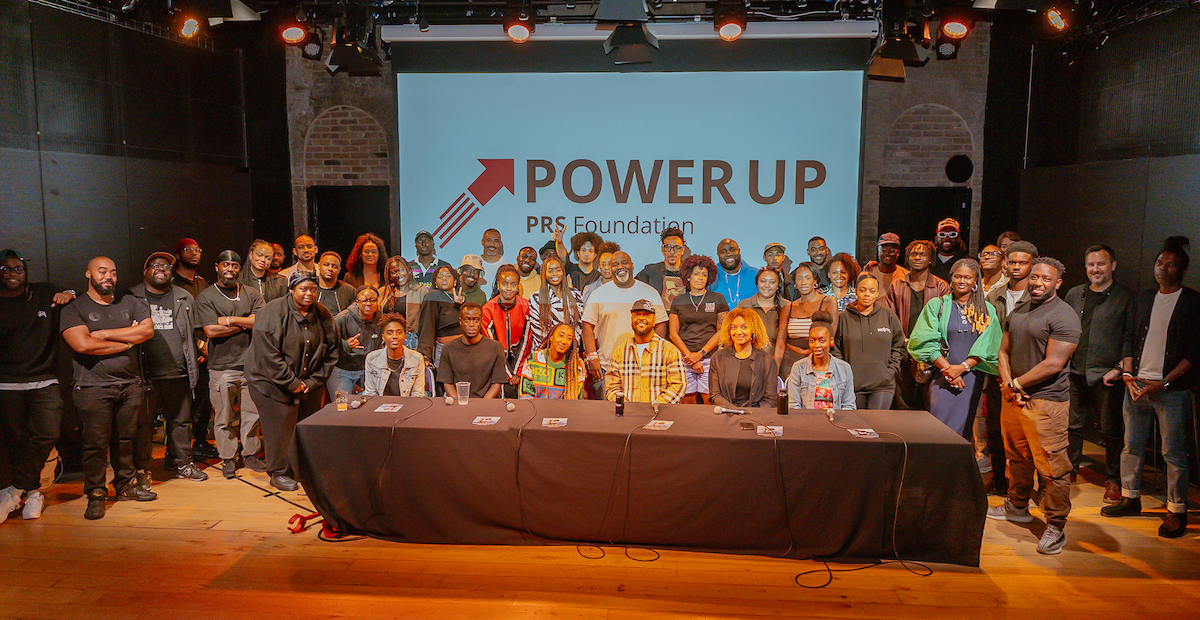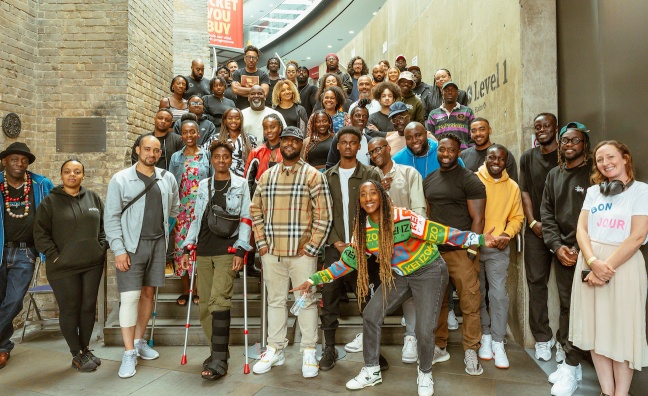Power Up organisers and participants have urged the music industry to back the initiative as it continues to transform the opportunities for Black talent.
Founded in 2021 by PRS Foundation and music manager Ben Wynter, Power Up has received 1,200-plus applications so far. The third year cohort of 22 industry professionals and 18 music creators was announced in July.
During an event at the Roundhouse, previous participants shared insights on Power Up’s career development for Black talent and connections created through the programme.
“You guys are family now,” creative entrepreneur and year two participant Keturah Cummings told the class of 2023.
Speaking to Music Week at the event, senior Power Up manager Yaw Owusu said: “It’s people’s careers but also their lived experiences and livelihoods. To see people come together and really connect with the energy and stories of others inspires me, it makes it all worth it.”
Power Up is a career development programme and project to accelerate change within the music industry. It includes grant support of up to £15,000 alongside masterclasses, mentoring, mental health and wellbeing support, and access to assistance from partners and the peer network.
With 120 participants since the launch, the project is developing its own momentum. As well as acts including Nova Twins, Ego Ella May and Yung Fume, industry professionals to come through the programme include Whitney Asomani (co-founder, Twenty:Two Agency), Travis Beckford (ASCAP associate director, UK & Europe), Christine Osazuwa (chief strategy officer, Shoobs) and broadcaster Jamz Supernova.
“To see the network tapping into each other’s skill sets and working together – which was always the vision – is phenomenal,” said Wynter, founder/CEO, Unstoppable Music.
Eunice Obianagha, founder & director of Enspire Management, has just become UK Music’s first diversity head.
Reflecting on her Power Up experience, she said: “What was most exciting was the vision of being able to create a network of people that can support each other, and see how Black professionals and artists can be elevated. It was about having the support system around me and others in a similar place.”
Obianagha suggested that Power Up is playing a crucial role by focusing on those who have already reached a certain level.
“Where’s the support [from elsewhere] for people that are already in senior or middle management, or need to be pushed into [those roles], especially Black executives?” she said. “Power Up is really important for that reason.”
Through its partnerships, it also provides access to key industry events.
“I’ve been around for a while, but it was because of Power Up that I had the first opportunity to go to the BRIT Awards,” noted Obianagha.
Just over two years since the launch, Wynter – also AIM’s entrepreneur & outreach manager – said the project is now established across the industry.
“It’s definitely a benchmark, when you speak to different companies they engage differently once they realise that a participant is on Power Up,” he said. “I’m starting to hear that more and more from our participants.”

Power Up was established in the wake of Blackout Tuesday in June 2020. Wynter aims to ensure that the commitment to eradicating racial injustice and establishing equality in the music industry is not forgotten.
“It’s really important that we remind people that this wasn’t just a lockdown thing,” said Wynter. “Power Up’s commitment is for 10 years, we can only do that with the support of the industry.”
PRS Foundation manages it in partnership with YouTube Music, Beggars Group, Spotify and the Black Music Coalition, as well as working with regional bodies, trade groups, charities, law firm Simkins and indie company Believe.
“In terms of funding, PRS Foundation is a proud contributor but we also rely on the industry and partners in collaboration,” Joe Frankland, CEO of PRS Foundation, told Music Week. “Over a dozen have put [funds] into the programme, but for us to still be here for the rest of the 10-year period, we need a lot more support from the sector as well.”
Wynter has called on the wider music industry to back the initiative.
“I’ve always been very keen for this to be something that is funded by the music industry,” he said. “The music industry said they wanted to see change with the black square movement.
“I do feel that there are still conversations that need to be had so that we can work more closely with majors, tech companies, some of the larger independents, and really have everybody on board and engaged.”
Wynter praised the diversity efforts of organisations including the Black Music Coalition (see p64) and Black Lives In Music.
“I’ve always said it’s not about chastising people,” he added. “It’s just about reminding people of their black square commitment, and then facilitating how they can ensure that they fulfil those commitments.”
Obianagha said that Power Up’s voice will become even more influential.
“It amplifies areas that need to be addressed so that it can attract solutions, and it amplifies talent to attract more opportunities and open more doors,” she said. “This is just the beginning of a long journey to come.”
Power Up is engaging with companies behind the scenes, as well as contributing to the debate at the policy level. Through the Ivors Academy, it gained a seat at the table for the Intellectual Property Office working group on metadata and fair pay from streaming.
“My job is to keep up awareness of how this [debate about streaming remuneration] affects the Black community, who ultimately were the early adopters, the tastemakers and the innovators on the DSP platforms, and behind the success of those platforms in the first instance,” said Wynter.
IMPALA honoured Power Up with its inaugural Changemaker Award last year, and encouraged the music sector in Europe to embrace the model.
Looking ahead to the 10-year vision for Power Up across the UK, Wynter is encouraged by the impact so far.
“It’s about building communities, building networks and building economies, so that people can thrive,” he concluded. “Three years in, we’re starting to see it and I think that’s amazing. Seven years from now, I can only imagine what that community will look like, what they’ll be able to achieve and the seats that people will be filling. I’m really excited to see how that plays out.”










